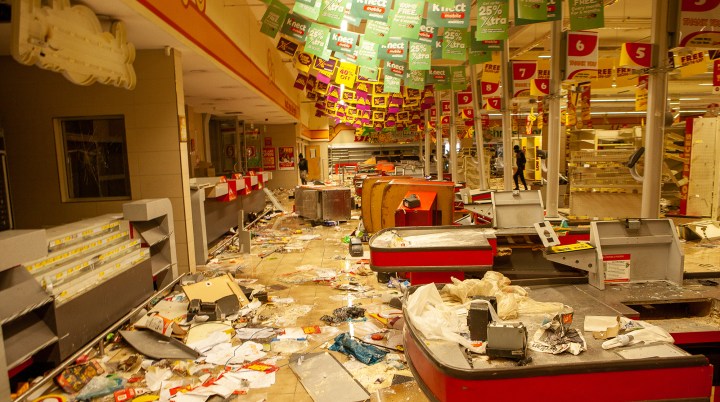BUSINESS MAVERICK
IMF study suggests civil unrest will have a significant economic impact on South Africa

As South Africa was grappling with the most devastating riots of the democratic era, the International Monetary Fund (IMF) last week released its findings on the economic consequences of social unrest. They bode ill for an economy embarking on a fragile recovery from the monumental 7% contraction of 2020.
The bottom line is that, on average, the IMF’s number-crunchers calculate that gross domestic product (GDP) “remains about 1 percentage point below its preshock level a year and a half after a major protest”.
The recent orgy of looting and rioting unleashed in part because of the jailing of former president Jacob Zuma for his sneering contempt of the rule of law would surely count as a “major protest”. South Africa was widely not seen getting back to pre-pandemic levels of output before 2023, so the flare-up – which killed over 200 people and fanned the pandemic’s lethal spread – will set badly needed economic growth back even further.
Flagged on the IMF blog last week as the flames were still raging in parts of Gauteng and KZN, the study was actually published in late May as an IMF working paper that estimated the macroeconomic impact of social unrest over the period 1990-2019. (Could Renewed Social Unrest Hinder the Recovery? and The Macroeconomic Impact of Social Unrest)
Among the drivers globally from social ructions have been “sharp contractions in manufacturing and services and consumption”. The study also found that “unrest lowers confidence and raises uncertainty; however, its adverse effect on GDP can be mitigated by strong institutions and by a country’s policy space”.
In this regard, South Africa is well and truly fucked, if readers will forgive this correspondent’s Latin. “Confidence” has been battered for years, while “uncertainty” has been a byword for policy in South Africa, which clearly has limited political “space” on this front. And South Africa’s state institutions, with a couple of exceptions, are anything but strong. Civil society and the private sector are in a different league, which gives some scope for hope.
The IMF also notes that “countries with weak fundamentals pre-pandemic are expected to suffer the most, should social discontent turn into unrest”.
South Africa was mired in recession before the pandemic struck, unemployment was already sky high, load shedding was an arduous fact of life, income and wealth disparities were massively stark, and a host of other economic indicators were shoddy at best, against the backdrop of a failing, graft-ridden state.
So expect the worst-case scenario for GDP growth prospects as one of the consequences of the wave of social unrest that just swept parts of South Africa, that coincided with the economic fallout from a once-in-a-century pandemic that is far from over.
The IMF’s most recent analysis of social unrest comes a few months after it unveiled a study which suggested that the lockdowns to contain the spread of Covid-19 may have bottled up the rage on the street, but that this state of affairs probably represented a deceptive calm before the storm. Read here.
And South Africa was just hit by a typhoon-scale event which shattered the illusion of calm.
“According to the latest Global Peace Index, the number of riots, general strikes and anti-government demonstrations around the world have increased by a staggering 244% in the last decade.
“Lockdowns and fears of contagion forced a temporary lull. But in virtually every region of the world, demonstrators are making a comeback,” the Fund noted in its blog last week.
“Public protests can be an important expression of the need to change policy. Governments need to listen and respond, but also try to anticipate people’s needs with policies aimed at giving everyone a fair shot at prosperity. Boosting employment, containing the long-term impact of the crisis and protecting those who have been left behind must remain priorities,” it said.
This requires a capable government that is not, say, riven by ruling party infighting over the spoils of patronage, corruption and rent-seeking. As it is, the private sector and ordinary people are already getting on with the job of rebuilding. But the country remains, and will be, poorer as a result of the mayhem.
A cynic might say that is one of the goals of the ANC’s RET faction of misfits. DM/BM

















 Become an Insider
Become an Insider
Comments - Please login in order to comment.